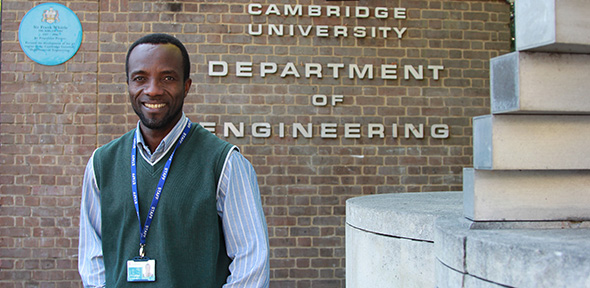
The National Health Service turned 70 in 2018 – but, amid the celebrations, its health is faltering.
If this work is successful, it has the potential to bring the local health economy back onto a sustainable path by establishing a new model of primary care that can be scaled throughout the NHS.
Professor Stefan Scholtes
By working closely with local hospitals and GPs, researchers at the University of Cambridge are developing bold new ideas they believe will help the NHS thrive for decades to come.
Alongside the Chinese People’s Liberation Army, Indian Railways and Walmart, the NHS ranks among the world’s largest employers. In England, it treats more than 1.4 million patients every 24 hours and will this year spend £126 billion. But as communities gathered to celebrate the NHS’s 70th birthday in 2018, reports continued to emerge on the ailing health of this much-loved national institution.
Analysis by another national treasure, the BBC, revealed that nearly one in five hospital trusts were failing to hit any of their key waiting-time targets. Hospitals seemed to be lurching towards over-crowded A&Es, bed shortages and queuing ambulances unable to hand over their patients.
Two University of Cambridge researchers have a grand vision to rethink the system to make it fit for the next 70 years – a vision that’s rooted in research with local patients and doctors.
Professor Stefan Scholtes works at Cambridge Judge Business School and Dr Alexander Komashie is a Senior Research Associate in Healthcare Systems Design at the Department’s Engineering Design Centre. Both are engineers by training, both have spent the past 10 years studying different parts of the local healthcare system and both are passionate believers that, as researchers, they can help make the NHS better.
System design
The NHS faces numerous challenges but the real test, says Dr Komashie, is understanding how to design better delivery systems by working with patients. “That’s where engineering comes in,” he says. “Engineers excel in designing large systems that work well, from worldwide telecommunications networks to the Airbus A380. What motivates me is translating the engineering practice of a systems approach into healthcare.”
The first step is understanding the system requirements. “It sounds obvious, but to design a system to do something you need to understand what it is you want,” Dr Komashie explains. “In engineering, a lot of effort goes into defining what the system should do. When you understand that, you can ask how the system is set up to deliver it.”
Dr Komashie has applied this systems engineering approach to adult mental health services within the Cambridgeshire and Peterborough NHS Foundation Trust (CPFT), and ran a series of workshops for patients and clinicians. Patients’ stories allow him to unpack each component of the delivery system and represent them in visual diagrams so that services can be improved in a systematic way. The project was funded and supported by the National Institute for Health Research (NIHR) East of England Collaboration for Leadership in Applied Health Research and Care (CLAHRC), hosted by CPFT.
“My goal is developing a new way of describing the system, and hearing people talk about their experience of care helps me understand it. If through patient and public involvement, we can get rich enough stories, it gives us a window into the system behind the story,” says Dr Komashie, who has recently been awarded an interdisciplinary fellowship for research into health systems visualisation at The Healthcare Improvement Studies Institute (THIS Institute). “Hearing patients’ accounts of what matters most helps to ensure the system designs and delivers the support they need.”
Sarah Rae, CPFT Expert by Experience, worked closely with Dr Komashie in bridging the gap between the academic researcher and the patient participants. “As workshop co-facilitator I gave the participants a better understanding of the research by helping them to make the connection between systems engineering and mental health,” she says. “Sharing my own lived experience of mental health also helped the participants feel more comfortable about describing their experiences authentically.”
Dr Komashie is now taking the tools he developed in mental health and applying them to vascular surgery and spinal cord injuries at Addenbrooke’s Hospital in Cambridge and holistic neuropsychological rehabilitation at The Princess of Wales Hospital’s Oliver Zangwill Centre in Ely.

The System Designer – Dr Alexander Komashie. Credit: Tom Almeroth-Williams
Working with GP practices
Headlines about NHS waiting times, bed shortages and ambulance queues invariably focus on capacity, which Professor Scholtes argues is a misdiagnosis. “People say we’ve got a capacity problem but that’s wrong. We have a complexity problem. There are so many things going on simultaneously but pulling in different directions. Complexity is killing hospitals.”
At Addenbrooke’s, for example, where Professor Scholtes spent three sabbaticals over the past 10 years, the hospital does everything from pulling wisdom teeth to multiple organ transplants. He argues that delivering this breadth of services in a system already at full stretch is impossible. Instead, hospitals need to be “decomplexified” by delivering most of their routine services in community settings.
It sounds simple, but it’s not. “The problem is that there’s no landing space. We have 92 GP practices locally, so how can you move work currently centralised in a large hospital to 92 small businesses? It’s impossible. The only way to make headway is to scale up primary care so that it can take on more responsibility,” says Professor Scholtes.
This is exactly what he’s doing with Granta Medical Practices, a large Cambridgeshire GP practice where he spent his most recent sabbatical evaluating the practice’s innovative operational and business model.
A critical barrier to change in primary care is the traditional GP partnership model, he says. By leaving GP partners with unlimited liability, the model creates risk aversion and hampers transformative change. In response, Granta is developing an innovative business model – an employee-owned trust akin to the John Lewis Partnership – which could enable it to deliver 70% of routine outpatient activity in the community and cut by 25% the number of emergency bed days among its patients.
But how can transforming Granta help the NHS as a whole? This is where the University comes in, says Professor Scholtes, who hopes to establish a Primary Care Innovation Academy, drawing on research expertise from across the University.
The Academy would provide leadership and management training for GPs, practice managers and lead nurses, and also ensure that interventions taken to transform the local primary care system are robustly evaluated. As such, it would add to the University’s increasing capacity in creating the evidence base for improving healthcare. For instance, THIS Institute is focusing on how to improve quality and safety across the system.
A “radically different” NHS
Addenbrooke’s Hospital itself has been transformed over the past three decades with a major emphasis on recruiting clinical academics in partnership with the University, who split their time between practising medicine and carrying out research.
Professor Patrick Maxwell, Head of the School of Clinical Medicine, explains: “Clinical academics have been central to the development of tertiary referral services and a major trauma centre. This has helped to create an excellent district and regional hospital with outcomes that are among the best in the country. Currently our priorities include improving prevention and early diagnosis of diseases, so that fewer patients need hospital services.”
Meanwhile, in January 2019, the NHS released its new 10-year plan, which included aims to boost ‘out-of-hospital’ care through increased investment in primary medical and community health services.
All in all, Professor Stefan Scholtes from the Cambridge Judge Business School believes that, by the time the NHS reaches its 80th birthday, it could look radically different: hospitals could be doing 60% of what they do now by focusing on cases that can only be treated in hospital and on cutting-edge treatments and research, while more integrated, scaled-up primary care practices will be taking full responsibility for out-of-hospital care.
“If this work is successful, it has the potential to bring the local health economy back onto a sustainable path by establishing a new model of primary care that can be scaled throughout the NHS,” he concludes. “It’s ambitious – but we can do it.”
Words: Becky Allen
- This article first appeared in a special issue of Research Horizons magazine focused on University of Cambridge research in the East of England.

